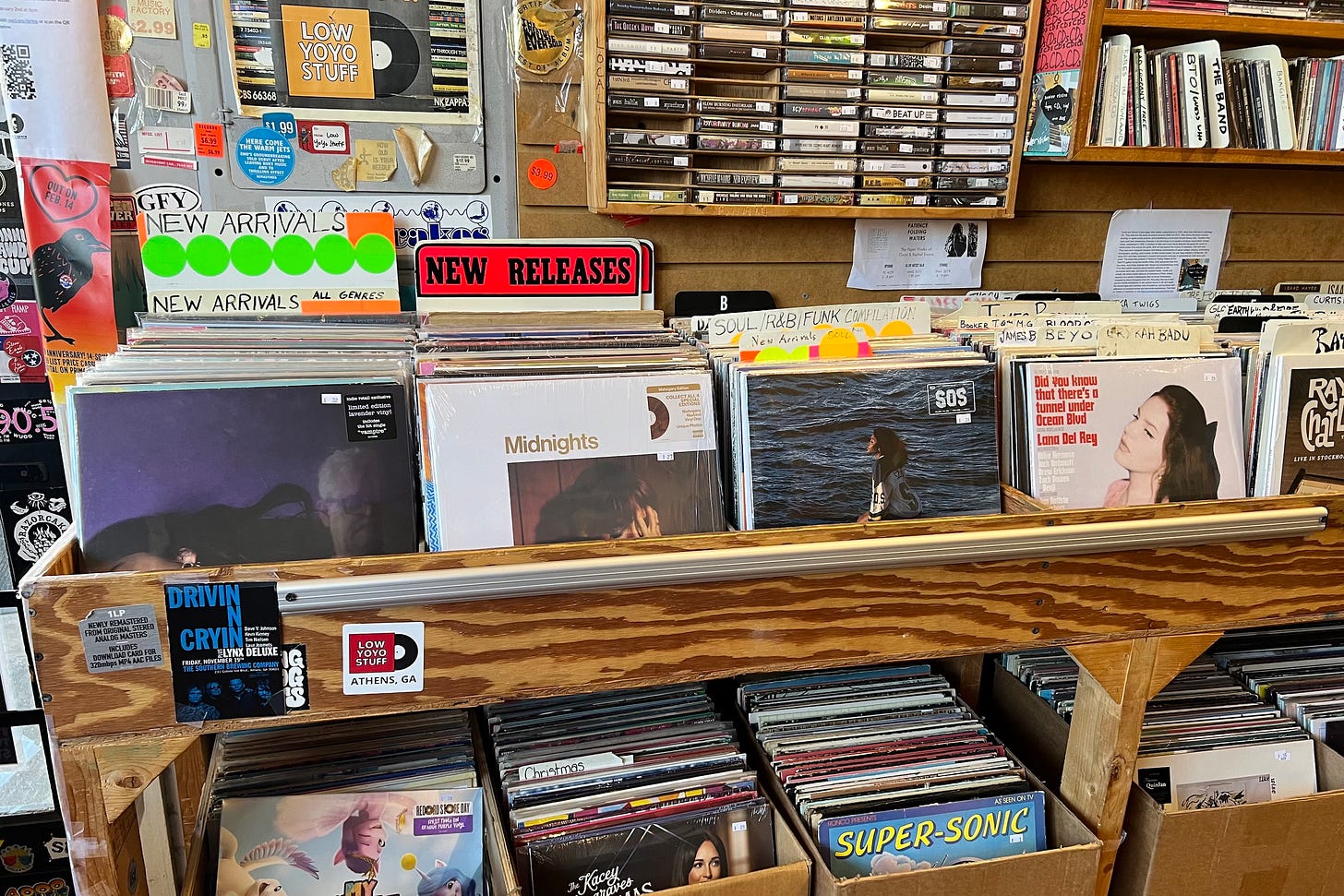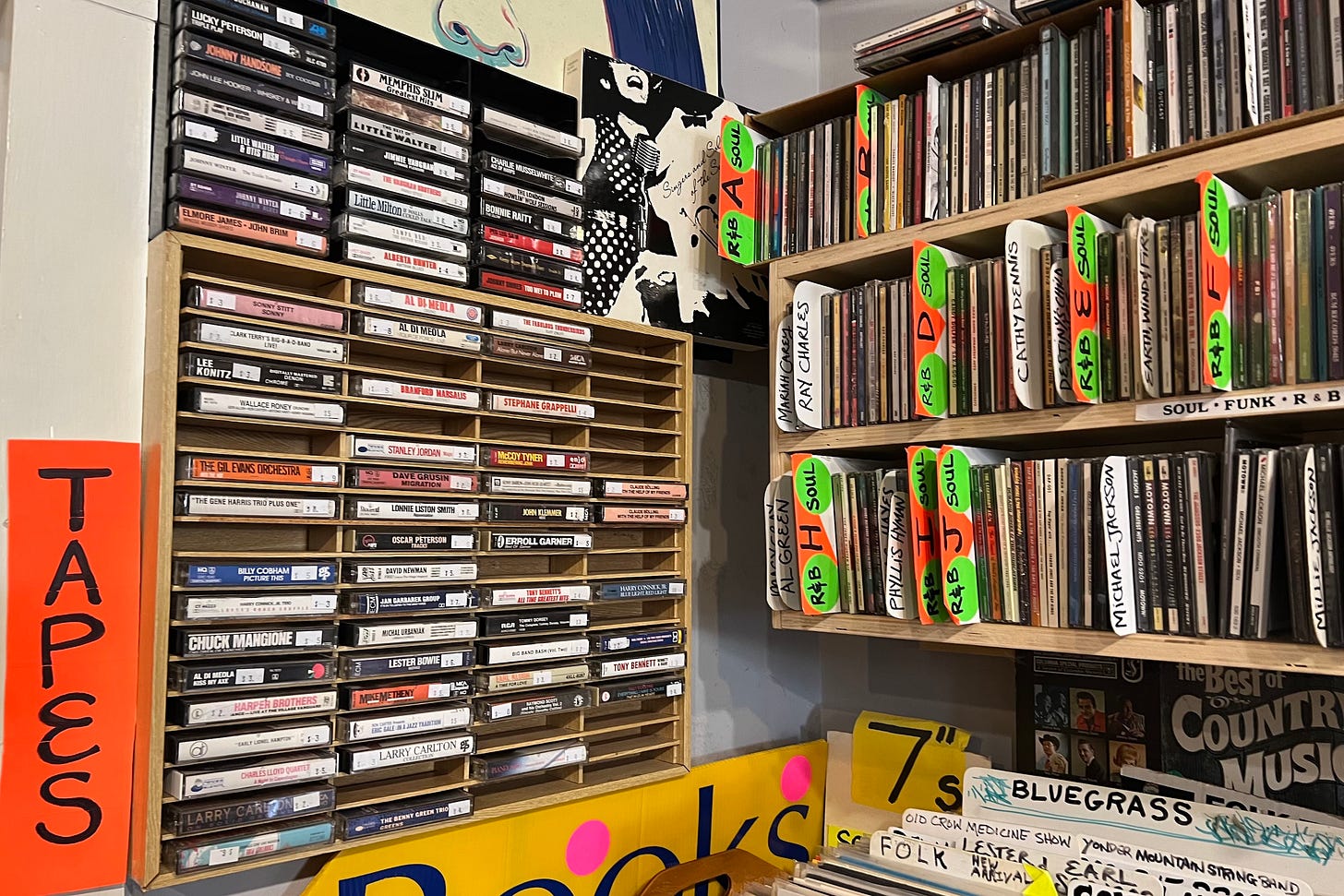If this project is my attempt to share what I’ve learned about how the music industry works, I should really make more of an effort to explain things as I go. For those of us who’ve spent a lot of time working in our complicated and hard-to-understand backwater of the economy, it’s easy to forget that the rest of the world finds a lot of our world to be almost impossible to follow.
I try not to mention any of those weird things without explaining them, but I don’t always pay enough attention. Sometimes they slide by like everyone should know what I’m talking about.
In my last post, “How CDs help fight distracted listening,” I went off on a tangent about the complicated ethics of buying used CDs and vinyl. Artists don’t make money from those sales, but they’re an important part of the independent retail economy.
Here’s what I wrote:
The other part of this equation is that very few independent record stores could stay open if the used music business didn’t subsidize the tiny margins they make on new releases.
That fact seems obvious to me, but maybe it’s counterintuitive for anyone who’s not in the retail trenches. New subscriber Tommy Thevenot asked me to explain, so I’ll give it a try.

A brief history
Music retail was a solid if not spectacular business up through the early ’90s. Independent shops and small local chains had to compete with the mall stores like Camelot and Musicland, but there wasn’t any individual retailer with too much leverage.
The CD boom changed all that. By the mid-’90s, it was raining money at the major labels because the music-buying public was splashing out for CD copies to replace the vinyl ones they’d bought over the past three decades. There was so much money.
Circuit City, Best Buy, Walmart, and Target took notice. CDs were excellent impulse buys. Those retailers bought thousands of copies, and priced them at outrageously low prices to lure customers into their stores to buy refrigerators or laundry detergent.
Best Buy was selling new releases for $9.99, a price lower than what your local indie store would have to pay a distributor for a copy that the store was expected to sell for $14.99. If you shopped indie at the end of the century, you would often see evidence of partially removed Circuit City or Best Buy price stickers on the new releases at your favorite store.
It was a matter of survival for some indie outlets to stock their stores with the same retail copies that were loss leaders for the big box stores. If ever went to a Best Buy when it opened on a Tuesday morning, you might see a scruffy guy with a huge stack of just-released CDs first in line at the register.
I remember the dread that hung over the record stores in Little 5 Points when the Edgewood District development opened with a Best Buy and a Target just south of the neighborhood. Would their customers skip their stores to save a few bucks at the big box?
Record companies put all their energy into moving tonnage at Best Buy and Walmart, pretty much abandoning the support they’d traditionally offered to independent retailers. 25 years later, the L5P shops are still standing. Best Buy doesn’t sell music (or movies) anymore, and Target doesn’t sell much besides Taylor Swift. Major labels have never rebuilt their relationships with independent retail.
Record companies went for the big numbers from retailers who weren’t in the music business and ignored the ecosystem that had built the business. Quite a few independent stores manage to adapt and survive, but we lost most of the small local chains around the country (Turtles, Peaches, Record Bar, Wherehouse, Spec’s, Strawberries).
The Big Box fallout

Customers want vinyl in 2025 and LPs are expensive to manufacture, especially when you compare them to CDs (still your best entertainment value). Vinyl often comes out weeks or months after a digital release, and artists often sell exclusive colors to their fans via direct marketing a long time before that retail street date.
Stores pay a premium for new vinyl, and their markup from wholesale to retail price is miniscule. Grocery stores also operate on tiny margins, but everyone has to eat and they do a massive volume of sales that allows those tiny individual margins to add up to a viable profit.
Back in the day, new vinyl (or tapes or CDs) sold in large enough quantities that a store could survive on what were slightly larger margins back then. No matter what those mainstream media stories about the vinyl revival might suggest, no one’s selling as many copies of new releases as they did back in the last century.
Most vinyl sales these days are one-way, meaning that a store can’t return unsold copies to their distributor for credit. If a store makes a mistake and orders too many of something, those unsold copies clog up the bins and cut further into the tiny margins they make on new releases.
That’s a complicated way of saying that most independent stores would go out of business in 2025 if they only sold new releases. Almost anything else you buy in the store is going to make more money for the retailer: t-shirts, stickers, coasters, posters, incense, turntables, record cleaning brushes, wall art, and almost any other music-adjacent item in stock has a healthier margin.

Their best margins are on used titles. Stores often mark them up 100% (or more), and those profits are generally what keeps the lights on. Customers used to scouring online stores for the absolute lowest price might take offense at that margin, but I’d remind you that I don’t see any record store owners making enough money to pay pop stars to fly on their rocket ships or sitting on the dais at the inauguration.
Is there a way to make things better for retailers?
Records that hit stores at the same time as they were available online and a reasonable return policy would take some pressure off retailers, but there a a lot of bands who desperately need those early, exclusive online sales just to stay afloat. There’s not an easy answer.
The physical media model is a mess. You can support your local retailer when you buy their t-shirt and used LPs and CDs in their stores. It also helps everyone for you to buy a few new releases in a store, but up-and-coming bands may benefit more if you buy from them direct. Of course, that keeps those bands from building up a following at retail and that’s not good for anyone’s long-term development and career prospects. I like to buy new bands in stores and order old people’s reissues online, but sometimes I buy the vinyl from the new band at a gig.
There aren’t any obvious solutions here. I try to spread my spending around to support as many people as I can. Here’s how I’ve spent money so far this month.
(Note: All the money I get from paid subscribers goes to pay for my music habit. You could tell yourself that you’re supporting music culture if you subscribe.)
I pay for Qobuz, my preferred streaming service.
I get Apple Music as part of my AppleOne family plan, and I use it in spite of the issues I have with its degenerating algorithm.
I pay for Spotify for work reasons, even though I loathe it. It’s the worst. Stop using it unless you have to.
I saw an excellent Gang of Four show here in Atlanta last week. I bought a ticket, a fantastic Shepard Fairey-designed poster (which doesn’t seem to exist on the internet, making it even better!), and a copy of Jon King’s book To Hell With Poverty.
I just preordered the upcoming vinyl reissue of the Soft Boys’ Underwater Moonlight via Robyn Hitchcock’s Bandcamp, but that was because my former Geffen colleague Ray Farrell posted that he had worked on the reissue and raved about the mastering quality.
I bought a Rhino High Fidelity vinyl reissue of ZZ Top’s Tres Hombres at Criminal Records this week because it was mastered by Kevin Gray and I want to compare it to the minty original pressing I recently got from Low Yo You Stuff in Athens.
I bought 17 vinyl LPs from the Dusty Groove store’s $1 bin and picked up a store t-shirt when I was in Chicago a few weeks back.
I mostly shop at thrift stores to buy stuff that’s too weird for used record stores. I hope the charities are spending my money well.
That’s not a perfect formula, but I try to think about where my money is going and how I can support as many people as possible.
No one deserves anything
I also got an in-person objection to this sentence from that piece:
People who make music deserve to earn a living, but so do the people who help make that music available for us to enjoy.
Let’s fix it: People who make music deserve an opportunity to earn a living, but so do the people who help make that music available for us to enjoy.
I know there are plenty of people in America who believe that the real heroes are the men who control the means of distribution and that they’re the only ones who should be getting paid. If creative people don’t have the ability or motivation to work because there’s no money in it, those titans will eventually go out of business because they won’t have anything to sell.
Streamers don’t charge enough to pay a fair royalty to artists, and some of them (Spotify) are even gaming the system to avoid paying royalties altogether. Margins on physical media are so tight that artists make far more money selling a few copies at gigs than they do from thousands of copies going through the traditional retail system.
The current market doesn’t give artists whose focus is recorded music much of a chance. And, yeah, I know some of you crusties will say that they should just fuckin’ go on tour like everybody else, but I’ve known more than a few extremely talented artists whose gifts were in the recording studio and not on stage. I’d be a lot happier if there was room for everyone to have a shot, including those who aren’t wired for the road.
Other bylines:
The Roku Channel is free, and you don’t need a Roku device to watch (TechHive/PC World)
Ecobee Smart Doorbell Camera (wired) review: A premium porch watcher (TechHive/PC World)







I am back to CDs and tapes, I enjoy records but they got too expensive about 15 years ago now and aren't as versatile/portable as the other two formats. Let's be honest too, CDs sound better they have always sounded better.
Ive been buying used from Forevervinyl.com for the last 30 years. First on the internet when no one was buying used records and CDs via the Internet, it was too geecky.